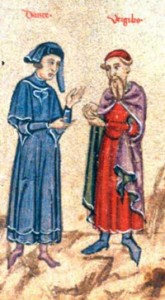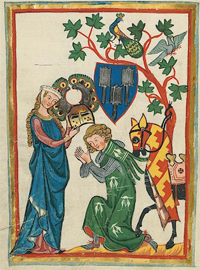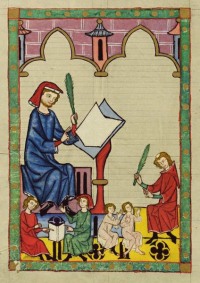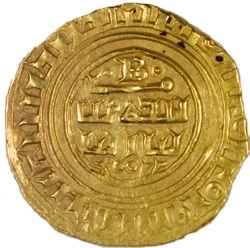From the ED: The populist obsession with the Middle Ages seems to demand that professional medievalists engage in discussions of Medieval Studies in the public sphere, be it through monographs and articles (in print or online), media interviews, online forums, blogs, Twitter, fiction, or public programming. At Kalamazoo and Leeds this summer, the question of what it means to BE a “public medievalist” was discussed in several different sessions. How can students and faculty leverage the public interest in all things medieval to the benefit of our scholarly and pedagogical pursuits? Is it incumbent upon us to challenge public misperceptions about the Middle Ages and ensure that medieval exempla are being appropriately applied and interpreted? Is it good for our careers to step out of academia and into the agora? Not everyone agrees that it is, although Richard Utz recently made a compelling argument in favor of public engagement in The Chronicle of Higher Education.
The Medieval Academy Graduate Student Committee roundtable on this topic at Leeds was wide-ranging and informative, generating much discussion during the session and at the reception afterwards. These conversations reverberated for weeks in the blogosphere and Twitterverse. We hope to continue this important discussion in other venues. Here is a field report from session chair Sanne Frequin (PhD Candidate, University of Amsterdam):
#S406 #IMC2015, THE PUBLIC MEDIEVALIST
At the IMC Leeds 2015, the Graduate Student Committee of the Medieval Academy of America sponsored a round table session about ‘the public medievalist’. The speakers – Matthew Gabriele (Virginia Polytechnic Institute & State University), Andrew James Johnston (Freie Universität Berlin), and Erik Kwakkel (Universiteit Leiden) – are all medievalists who model a number of ways of combining scholarship with public engagement. They addressed some of the ways in which they have engaged with medieval topics in the public sphere and what opportunities and challenges that presented for them. The session complemented a roundtable on a similar topic – what it means for medievalists to be public intellectuals today – that was held at the International Congress on Medieval Studies at Kalamazoo this past May. In Leeds, the roundtable attracted a crowd of seventy-five attendees, many ultimately sitting on the floor and in window frames. The question of what it means for medievalists to be public intellectuals today is obviously a pressing question for early-career scholars.
The speakers all started with a short introduction, speaking about why they thought of themselves as public medievalists. Gabriele highlighted the political side of being a medievalist. Kwakkel talked about his social media experience. Johnston said that he didn’t consider himself to be a public medievalist at all and questioned the need to become one.
There thus were many different angles to start the discussion. The moderator asked the audience, after the introductions, if any of them considered themselves to be a ‘public medievalist’. There were only a couple of hands that went up. The discussion started with practical issues, for example, a discussion of video-blogs. Kwakkel warned the audience that video-blogs require significant amounts of time, but he did recommend blogging itself. The discussion also touched the political role of the public medievalist. Gabriele gave an example of the discussion about the Confederate flag and his response to this issue in his blog. That provoked a reaction from Johnston who argued that history should not necessarily be used as an explanation for current events. Another subject was the issue of career development. A young scholar asked if presenting our research on social media (for example Twitter) could be harmful for an early-career scholar. Erik Kwakkel advised listeners to stay close to their research. He suggested writing only about what you know, keeping it low-key and, most important, sticking with what fits you as a person and as a scholar. Twitter can be helpful, according to Kwakkel, but only if you enjoy it and if it works for your research. The last major topic was the general public. A member of the audience stated that, when sending our message as public medievalists, we tend to primarily target a highly-educated public. She stated that we should also work on translating our research to a broader audience. There were some heritage specialists in the audience who pointed out the importance of museums in this mission. The discussion turned to the responsibility of scholars in spreading our research to a public audience.
An important point that was raised during the discussion and that sparked the online discussion on Twitter (#s406 was trending during the discussion) was the composition of the panel. The panel consisted of three male scholars (on Twitter a so-called #manel). A female member of the audience remarked that it wasn’t quite an accurate representation of the scholarly field. In this particular case, a more diverse panel was originally constituted by the organizers. Sarah Peverley (University of Liverpool) had to drop out and was replaced by Kwakkel. Although there unfortunately wasn’t enough time to delve into this issue during this discussion, it clearly is a topic that deserves more attention.
As the moderator of the session I enjoyed the very lively debate during this round table. I would like to thank the panelists, the audience and the “Tweeps” for their input. When I asked the audience at the end of the session if any of them would like to become a ‘public medievalist,’ many hands were raised. In my opinion a very promising prospect for the future of medieval studies. I hope to meet you all online!
Sanne Frequin
PhD candidate University of Amsterdam
Twitter: @a_tomb_a_day







